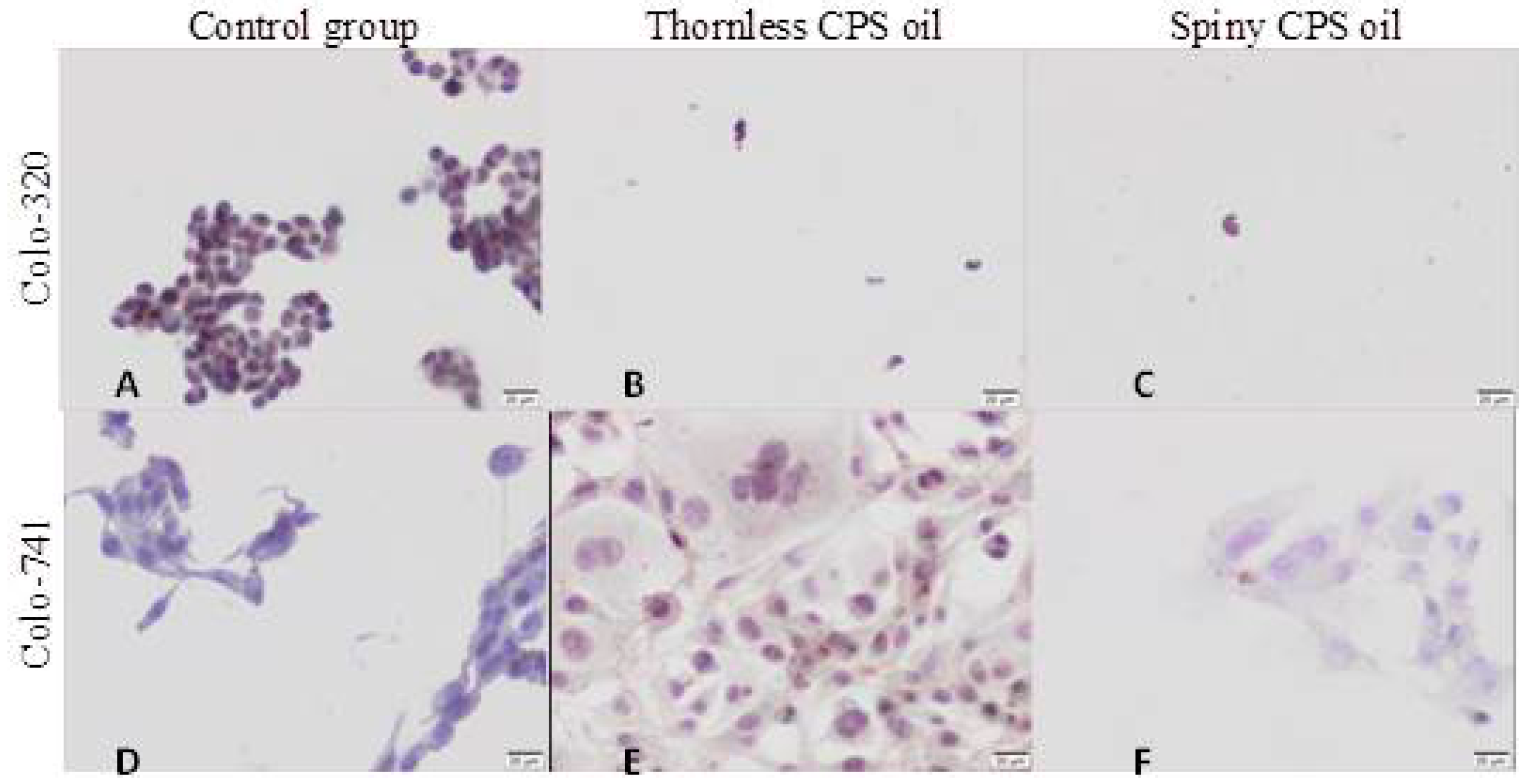Apoptotic Effects of Opuntia ficus indica L. Seed Oils on Colon Adenocarcinoma Cell Lines †
Abstract
:1. Introduction
2. Experimental Procedure
3. Results and Discussion
4. Conclusions
Acknowledgments
Conflicts of Interest
References
- Rtibi, K.; Selmi, S.; Saidani, K.; Grami, D.; Amri, M.; Sebai, H.; Marzouki, L. Reverse Effect of Opuntia ficus-indica L. Juice and Seeds Aqueous Extract on Gastric Emptying and Small-Bowel Motility in Rat. J. Food Sci. 2018, 83, 205–211. [Google Scholar] [CrossRef] [PubMed]
- Berraaouan, A.; Ziyyat, A.; Mekhfi, H.; Legssyer, A.; Sindic, M.; Aziz, M.; Bnouham, M. Evaluation of antidiabetic properties of cactus pear seed oil in rats. Pharm. Biol. 2014, 52, 1286–1290. [Google Scholar] [CrossRef] [PubMed]
- Mericli, F.; Becer, E.; Kabadayı, H.; Hanoglu, A.; Hanoglu-Yigit, D.; Ozkum yavuz, D.; Ozek, T.; Vatansever, S. Fatty acid composition and anticancer activity in colon carsinoma cell lines of Prunus dulcis seed oil. Pharm. Biol. 2017, 55, 1239–1248. [Google Scholar] [CrossRef] [PubMed]
- Chougui, N.; Tamendjari, A.; Hamidj, W.; Hallal, S.; Barras, A.; Richard, T.; Larbat, R. Oil composition and characterisation of phenolic compounds of Opuntia ficus-indica seeds. Food Chem. 2013, 139, 796–803. [Google Scholar] [CrossRef] [PubMed]
- Yeddes, N.; Chérif, J.K.; Jrad, A.; Barth, D.; Trabelsi-Ayadi, M. Supercritical SC-CO(2) and Soxhlet n-Hexane Extract of Tunisian Opuntia ficus indica Seeds and Fatty Acids Analysis. J. Lipids 2012, 2012. [Google Scholar] [CrossRef] [PubMed]
- Coşkuner, Y.; Tekin, A. Monitoring of seed composition of prickly pear (Opuntia ficus-indica L.) fruits during maturation period. J. Sci. Food Agric. 2003, 83, 846–849. [Google Scholar] [CrossRef]
- Wong, R.S. Apoptosis in cancer: From pathogenesis to treatment. J. Exp. Clin. Cancer Res. 2011, 30, 87. [Google Scholar] [CrossRef] [PubMed]
- Zhang, C.; Yu, H.; Shen, Y.; Ni, X.; Shen, S.; Das, U.N. Polyunsaturated fatty acids trigger apoptosis of colon cancer cells through a mitochondrial pathway. Arch. Med. Sci. 2015, 11, 1081–1094. [Google Scholar] [PubMed]


| Control Group | Thornless CPS Oil | Spiny CPS Oil | |
|---|---|---|---|
| Colo-320 cells | 3.91 ± 0.72 | 50.66 ± 34.59 * | 40 ± 37 |
| Colo-741 cells | 3.38 ± 3.22 | 9.53 ± 2.34 | 11.03 ± 9.6 |
Publisher’s Note: MDPI stays neutral with regard to jurisdictional claims in published maps and institutional affiliations. |
© 2018 by the authors. Licensee MDPI, Basel, Switzerland. This article is an open access article distributed under the terms and conditions of the Creative Commons Attribution (CC BY) license (https://creativecommons.org/licenses/by/4.0/).
Share and Cite
Becer, E.; Kabadayı, H.; Meriçli, F.; Meriçli, A.H.; Kıvançlı, B.; Vatansever, S. Apoptotic Effects of Opuntia ficus indica L. Seed Oils on Colon Adenocarcinoma Cell Lines. Proceedings 2018, 2, 1566. https://doi.org/10.3390/proceedings2251566
Becer E, Kabadayı H, Meriçli F, Meriçli AH, Kıvançlı B, Vatansever S. Apoptotic Effects of Opuntia ficus indica L. Seed Oils on Colon Adenocarcinoma Cell Lines. Proceedings. 2018; 2(25):1566. https://doi.org/10.3390/proceedings2251566
Chicago/Turabian StyleBecer, Eda, Hilal Kabadayı, Filiz Meriçli, Ali Hikmet Meriçli, Barış Kıvançlı, and Seda Vatansever. 2018. "Apoptotic Effects of Opuntia ficus indica L. Seed Oils on Colon Adenocarcinoma Cell Lines" Proceedings 2, no. 25: 1566. https://doi.org/10.3390/proceedings2251566
APA StyleBecer, E., Kabadayı, H., Meriçli, F., Meriçli, A. H., Kıvançlı, B., & Vatansever, S. (2018). Apoptotic Effects of Opuntia ficus indica L. Seed Oils on Colon Adenocarcinoma Cell Lines. Proceedings, 2(25), 1566. https://doi.org/10.3390/proceedings2251566





